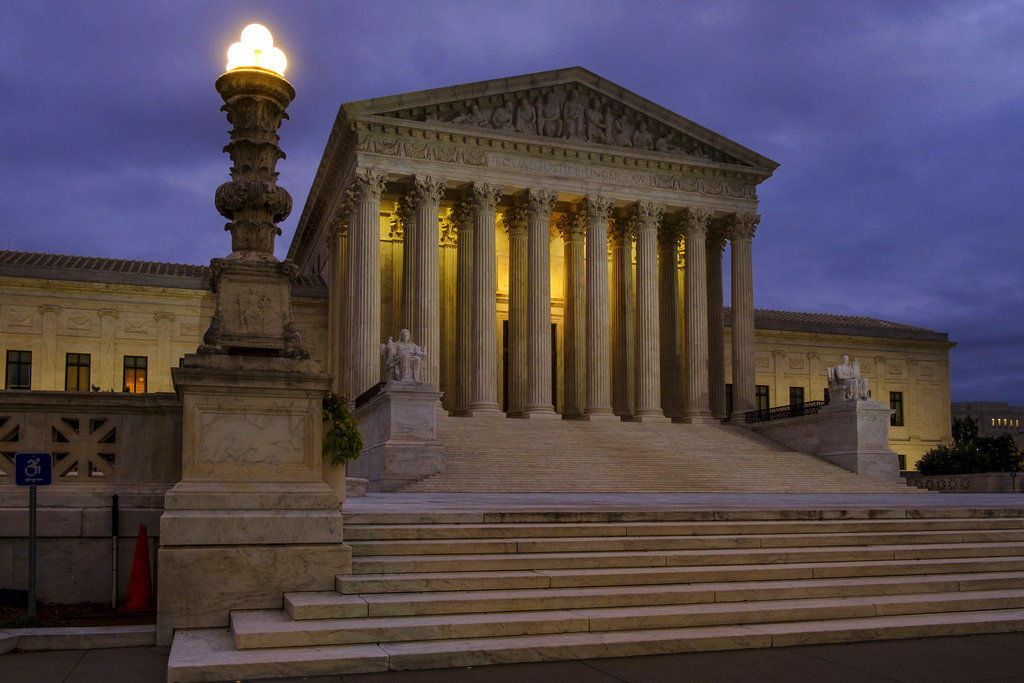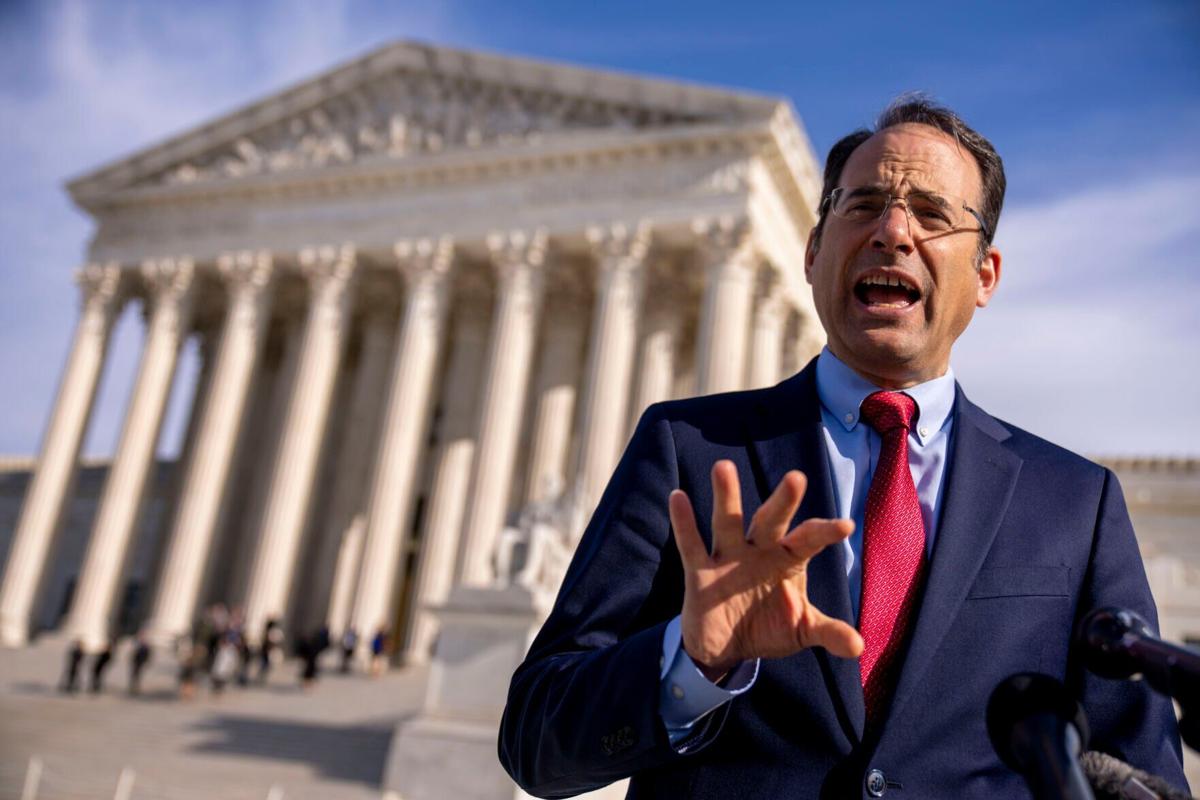Appeals court orders new trial in stalking case a year after U.S. Supreme Court finds flaw
Colorado’s second-highest court on Thursday ordered a new trial in the Arapahoe County stalking case that went all the way to the nation’s highest court and resulted in a new burden for prosecutors seeking to convict alleged stalkers based on their communications.
Last year, by 7-2, the U.S. Supreme Court handed down its ruling in Counterman v. Colorado, in which jurors convicted Billy Raymond Counterman of stalking after he deluged a musician with messages both benign and disturbing. The majority determined Colorado could not find the defendant guilty solely if a person could deem his messages objectively threatening.
Instead, to prevent a First Amendment violation, prosecutors now need to show an alleged stalker’s recklessness — meaning he “consciously disregarded a substantial risk that his communications would be viewed as threatening violence.”

The U. S. Supreme Court building before dawn in Washington.
J. David Ake / AP

The U. S. Supreme Court building before dawn in Washington.
Although a three-judge panel for the Court of Appeals originally concluded in 2021 that Counterman’s messages were “true threats” undeserving of constitutional protection, Judge Craig R. Welling in the new ruling conceded even the more aggressive communications from Counterman did not definitively show he was aware of their threatening nature.
“This is particularly true where, as occurred at trial, Counterman was prohibited from introducing any evidence or making any argument related to his subjective intent,” wrote Welling in the June 13 opinion. “And not only was Counterman precluded from introducing any evidence regarding his mental state at trial, but the jury was also specifically instructed not to consider Counterman’s mental state in deliberations.”
Last week, prior to releasing its new decision in Counterman’s case, the Court of Appeals reversed a similar stalking conviction for the first time in the wake of the Supreme Court’s new mental state requirement for prosecutors.
Counterman sent scores of unsolicited Facebook messages to his alleged victim, insinuating he had her under surveillance: “Was that you in the white Jeep?” “I’m currently unsupervised. I know, it freaks me out, too.” “Five years on Facebook. Only a couple physical sightings.” “Die. Don’t need you.”
Counterman’s trial judge found the statements rose to the level of true threats and, therefore, prosecuting him for stalking did not infringe on his First Amendment rights. The Court of Appeals panel subsequently agreed that looking at the context objectively, as the law required at the time, Counterman’s messages opened him up to criminal liability.
“Recent widely reported cases of online harassment and stalking of public figures — particularly of women — involve internet users who are ‘strangers to the victims’ granted previously unavailable access to their targets through social media,” noted Welling, who also authored the original appellate decision.
The Supreme Court elected to review the case, which Attorney General Phil Weiser argued himself. He urged the justices not to add a requirement for juries to explore an alleged stalker’s intent, as “delusional” stalkers could genuinely claim they were in a relationship with their victim, while “devious” stalkers could say their threatening messages were jokes.

Colorado Attorney General Phil Weiser walks out of the Supreme Court in Washington, Monday, Dec. 5, 2022, after the Court heard the case 303 Creative LLC v. Elenis. The Supreme Court is hearing the case of a Christian graphic artist who objects to designing wedding websites for gay couples, that's the latest clash of religion and gay rights to land at the highest court. (AP Photo/Andrew Harnik)
Andrew Harnik

Colorado Attorney General Phil Weiser walks out of the Supreme Court in Washington, Monday, Dec. 5, 2022, after the Court heard the case 303 Creative LLC v. Elenis. The Supreme Court is hearing the case of a Christian graphic artist who objects to designing wedding websites for gay couples, that’s the latest clash of religion and gay rights to land at the highest court. (AP Photo/Andrew Harnik)
Skeptics of the Supreme Court’s decision to impose a mental state component noted the justices had not focused on the costs to Counterman’s alleged victim, who canceled some of her own performances for fear of her stalker showing up.
“So we have free speech interests on one side of the balance. But there are also free speech interests on the other side of the balance. Apparently, these latter speech interests are more easily overlooked or discounted,” wrote R. George Wright, a law professor at Indiana University.
Returning to the Court of Appeals, the prosecution argued Counterman should not receive a new trial because the evidence clearly showed Counterman understood his communications were viewed as threatening.
By creating new accounts for sending messages after his victim repeatedly blocked him, Counterman “recognized he was blocked for things he said, yet he persisted,” wrote Assistant Solicitor General Joseph G. Michaels. In other words, he acted recklessly.
The appellate panel agreed there was “strong evidence” Counterman recklessly communicated with the victim, but jurors still needed to evaluate his mental state. It was also not sufficient, noted Welling, that jurors had the option of convicting Counterman based on his non-speech contacts, too.

The Ralph L. Carr Colorado Judicial Center in downtown Denver houses the Colorado Supreme Court and Court of Appeals. (Michael Karlik/Colorado Politics)
Michael Karlik/Colorado Politics

The Ralph L. Carr Colorado Judicial Center in downtown Denver houses the Colorado Supreme Court and Court of Appeals. (Michael Karlik/Colorado Politics)
“The fact that evidence was also presented (and instructions given) that would have permitted the jury to convict Counterman of stalking based on conduct that doesn’t implicate the First Amendment,” he wrote, “does nothing to ameliorate the risk that that the jury’s guilty verdict was based on Counterman engaging in speech protected by the First Amendment.”
The 18th Judicial District Attorney’s Office did not have an immediate comment on the decision, but a spokesperson said most stalking cases currently involve non-speech surveillance or contact with victims, which the Supreme Court’s decision does not affect.
The case is People v. Counterman.




